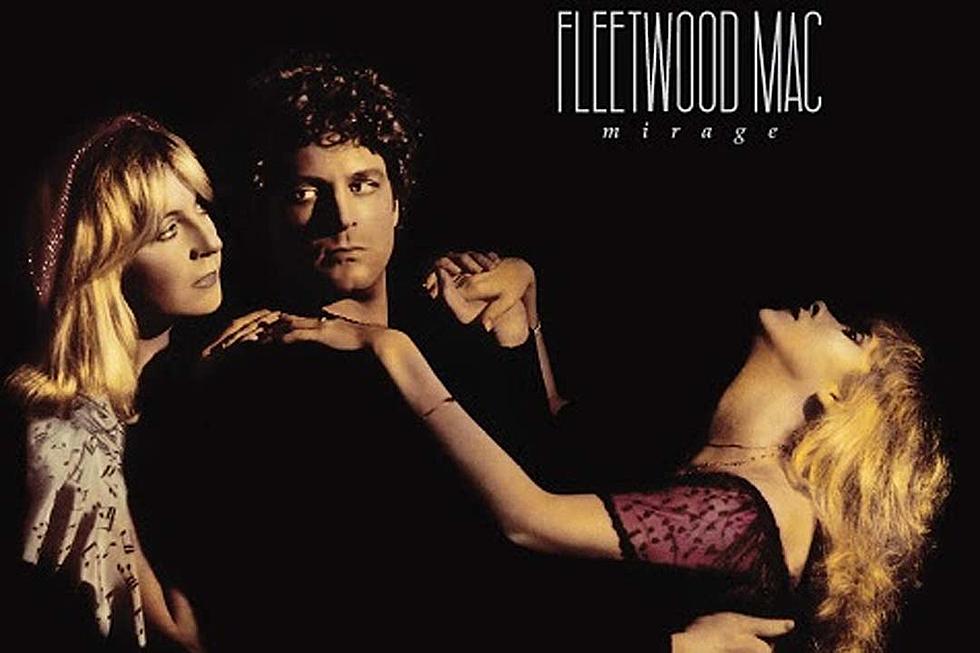
How Fleetwood Mac Finally Recovered With ‘Mirage’
After scoring a career-defining smash with Rumours, Fleetwood Mac took a big gamble with their follow-up effort, Tusk. The comedown stung enough to alter their creative trajectory on the band next album, 1982's Mirage.
Of course, Tusk's failure was absolutely relative: it was still a Top Five hit that went multi-platinum and sent three singles into the U.S. Top 20. But coming after the world-beating success of Rumours, Fleetwood Mac couldn't help feel like they'd missed the mark somehow — chiefly guitarist Lindsey Buckingham, who'd taken tight control of the reins for the project and bore the weight of the album's perceived problems for years.
Compounding those issues was an overall lack of group focus that stemmed from a drift toward solo projects undertaken by Buckingham and singer Stevie Nicks, as well as drummer Mick Fleetwood. Nicks, whose distinctive vocals had graced some of Fleetwood Mac's biggest hits, enjoyed immediate success outside the band, and her decreased availability affected their chemistry going into Mirage.
Calling the end result "a reconciliation of opposites," Buckingham tried to identify the different strands of songwriting that fed into Mirage by comparing the album to its immediate predecessors. "There are some aspects of Tusk and some aspects of Rumours, but Mirage is much more of a band album than Tusk was."
That being said, Buckingham had to admit there were some ways in which Mirage — at least for him — couldn't stand shoulder-to-shoulder with the other records he'd made with Fleetwood Mac. "After Rumours sold 16 or 17 million copies, we had the freedom — and the courage — to try some other things," he continued. "I got a lot of support from the band during the making of Tusk, but when it became apparent that it wasn’t going to sell 15 million albums, the attitudes started to change. That was sad for me in a way, because it makes me wonder where everyone’s priorities are. To me, the point of making records is to shake people’s preconceptions about pop."
Mirage wasn't about to shake anyone's perceptions of pop — or of Fleetwood Mac, whose most commercially successful era was distilled in a 12-song track listing that served up keyboardist Christine McVie's lush pop songcraft, Buckingham's wiry experimentation, and Nicks' ethereal ruminating in equal measure.
It wasn't exactly Rumours — no record could have been — but it bore the distinct echo of hit Mac records past. As Mick Fleetwood saw it, that wasn't so much a result of the band capitulating to expectations as it was a byproduct of a more democratic vision.
Listen to Fleetwood Mac's 'Love in Store'
"There was a very slight element of saying, ‘Well, I wonder what we’d do if we were doing these songs in the same sort of musical frame of mind as Rumours?’ Just playing, that’s how it was when we made Rumours," Fleetwood argued. "It was just a bunch of people playing. Whereas on Tusk, there were some real inroads creatively made and spearheaded by Lindsey, Mirage was back to business as usual."
"Business as usual" added up to another hit for the band. Released June 18, 1982, Mirage returned Fleetwood Mac to the top of the album charts in the U.S., with three singles — McVie's "Love in Store," Nicks' "Gypsy," and the McVie/Buckingham duet "Hold Me" — entering the Top 40 on the record's journey to double-platinum sales certification. Yet even as they rebounded — and gave the fans what they evidently wanted — the band was dogged, as ever, by the shadow of conflict.
With Nicks' solo career in bloom, the persistent question became one of whether she'd stick within the ranks. After years of untangling the fallout from the band members' respective busted love affairs, it had to have been wearying to deal with another round of rumo(u)rs. Still, when all the non-musical issues were cleared away and they were able to play, the lineup's spark was more than enough to carry them through.
"There have been many rough times," Christine McVie conceded. "But we’ve always ended up on some high note, standing around and jamming, or whatever, just really getting a charge out of playing together. It’s a joyous situation, and that takes over the bad points."
Ultimately, Mirage fell victim to the same inflated expectations that loomed over everything else the band would try to do in the immediate wake of their late-'70s sales peak. Though it was the type of hit most other bands would kill for, it suggested Fleetwood Mac's biggest days were behind them.
It'd be another five years before they regrouped for their next release, Tango in the Night, and that album's success wasn't enough to keep the lineup from fraying: Buckingham would depart before they could tour for Tango, and Nicks would split too after its follow-up, 1990's Behind the Mask.
Yet with enough time, a growing number of fans — and the band members themselves — have come to develop a new appreciation for Mirage. In spite of its somewhat difficult gestation, the record boasts a number of songs that have earned spots of honor in the Fleetwood Mac catalog — something a bemused-sounding Fleetwood noted while looking back on the album prior to its deluxe reissue in 2016.
"If you were a sort of super-intellectual critic, which is maybe not a great place to come from, it would be fair game to say the album kind of went backwards," Fleetwood told Rolling Stone. "Having said that, the amazing thing is that, looking back on it now in the present day, so many of those songs are at a very high level in the continuing story of Fleetwood Mac."
Fleetwood Mac Lineup Changes: A Complete Guide
Why Don't More People Like This Fleetwood Mac Album?





